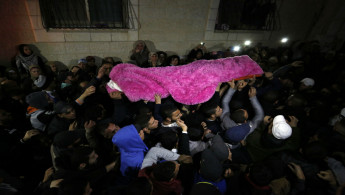Israel sets conditions on the handover of Palestinian bodies
Israeli authorities are holding the bodies of many Palestinians who were killed by Israeli forces after being suspected of attempting to carry out attacks against Israel.
The families of the killed Palestinians face tough conditions set by Israel in return for the bodies of their dead, which some have accepted while others have rejected, while the Palestinian authority remains silent regarding this inhumane Israeli practice.
One conditions set by Israeli authorities is that families receive the bodies ad bury them during the night, which prevents the family from conducting an independent autopsy to figure out the cause of death.
In many cases, Palestinians were subject to summary executions by Israeli forces or shot and left to bleed to death with no medical assistance, and Israel currently hold the bodies of 55 Palestinians killed by its forces.
The father of 16-year-old Palestinian girl Ashraqat Qatnani, who was run over by an Israeli setter and the shot by Israeli forces near Nablus, said he refuses to receive the body of his daughter under any Israeli conditions.
"The occupation wants us to receive the body at night and to bury her within a short time," said Qatnani.
"I fear that there is something that we have not been informed of, which is obviously by not giving us enough time to conduct an autopsy," added the father.
The governor of Nablus, Akram Rajoub had met with the family of Qatnani and the family of 21-year-old Maram Hassounah who was killed at the Annab checkpoint to relay the Israeli conditions for the handover of the bodies of the two young girls.
 |
Upon receiving the body the family was able to identify at least 18 bullet wounds in the body of their young girl with a number of bullets that had severed her right hand. |  |
"The conditions that we were informed of were to receive the body at night and for the funeral procession not to go close to Israeli checkpoints," said Anwar Hassounah, Maram's uncle.
In another example, a Palestinian family whose daughter was killed by Israeli forces was visited by a Palestinian officer who informed the family that an Israeli officer would like to speak to them about receiving their daughter's body.
"When my father agreed to hear what the Israeli officer had to say, the Palestinian officer called him and put him on speaker phone," said Rami Owaisi, the brother of 23-year-old Rasha Owaisi.
"The Israeli officer told my dad: 'I don't want the girl's funeral procession to come out in the light of day, it has to be dark'," added Rami.
The Israeli officer also held the father responsible for any troubles that might occur during the girl's funeral procession and demanded that the father take control of his sons and the neighbourhood to ensure they behave in accordance with Israeli wishes.
Having no choice, the Owaisi family accepted the terms dictated by the Israeli officer.
Upon receiving the body the family was able to identify at least 18 bullet wounds in the body of their young girl with a number of bullets that had severed her right hand.
Rasha Owaisi, a third year student of geography, was killed on 9 November. She was engaged and had planned to be married this week.
A number of rights organisations believe that this practice by the Israeli authorities is to ensure that Palestinians do not conduct independent autopsies and bury any criminal evidence that might indict Israeli soldiers.
"Israeli authorities want to make sure that Palestinian do not have any legal avenues or evidence to prosecute for murder, summary executions, or criminal medical negligence," said Issam al-Arouri, the director of the Jerusalem Centre for Legal Assistance.
"This is why Israel set these conditions so the evidence is buried with the bodies," added al-Arouri.


